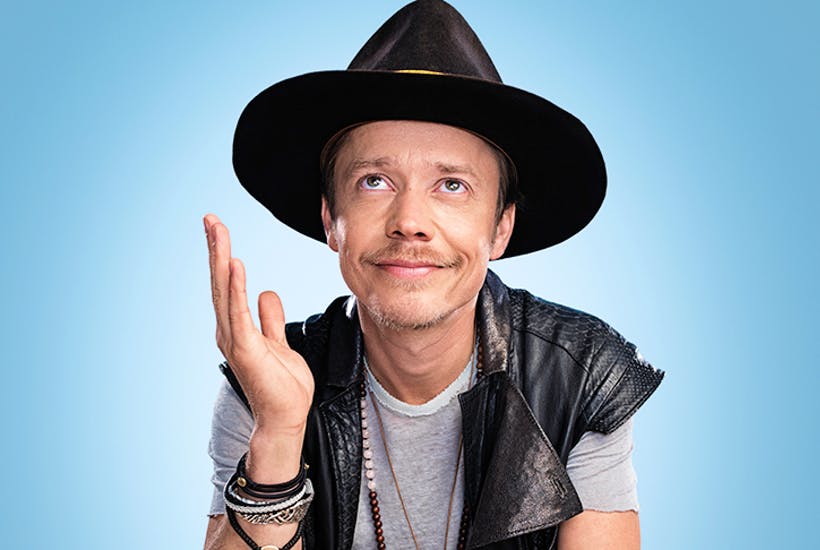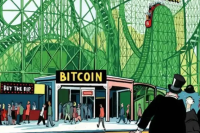Bitcoin, we’re told endlessly, is both the currency of choice for tax-dodging criminals and a vehicle to instant wealth for incautious dreamers (who in reality are destined to lose their money). But that’s not how many of the entrepreneurs who have latched onto it see things. There’s a kind of utopian ideology emerging from crypto-currencies.
If the archetypal internet pioneer was a ponytailed nerd in a T-shirt who believed in the liberalisation of information and free fruit juice for all, pioneers of bitcoin are more likely to be found in surplus army gear, coveting some obscure corner of the globe as their own little micro-state where like-minded people can escape the oppression of the traditional nation-state. Either that, or they have dreamed up some anarchist future where we all live in small autonomous communities.
Take self-styled anarchist Amir Taaki, for example. A British-Iranian, he founded bitcoin trading platform Dark Wallet, which allowed individuals to trade beyond the reach of governments. He seemed surprised when it started to be used by Islamic State and, perhaps to make amends, in 2015 travelled to Syria to fight the terror group. There, he says, he spent a few months on the front line, Kalashnikov in hand, before helping to crowdfund development of the region’s fertiliser factories.
Earlier this year, Taaki set up a commune of hackers in Barcelona to aid revolutionary movements around the world. Its ultimate purpose, he says, is to bring about the ‘complete collapse of the world state system’ via the use of bitcoin. The Catalan independence movement, he adds, is misguided. He believes the route to secession from Spain is through the use of bitcoin to avoid paying Spanish taxes, a suggestion unlikely to go down too well with either the Spanish tax authorities or Catalan separatists, who have their own national flag and see themselves very much as an embryonic nation state.
Another wildman of bitcoin is Brock Pierce, once a child actor and now chairman of the Bitcoin Foundation. He’s estimated by Forbes to be worth between $700 million and a $1 billion. At the end of last year he was one of several bitcoin entrepreneurs who travelled to hurricane-ravaged Puerto Rico to explore creating a crypto-utopia they initially wanted to call Puertopia — until it was pointed out that this was a little too close to ‘eternal boy playground’ in Latin. They changed the name to the less-dodgy sounding ‘Sol’.
According to Pierce, the aim is to create a bitcoin city — possibly on an old military base the US government has put up for sale — which will thrive on ‘compassion, respect and financial transparency’. It’s just possible the tax situation in Puerto Rico might also have something to do with the attraction. The US overseas territory has no capital gains tax; quite an advantage when cashing in your profits from last year’s bitcoin boom.
While Puerto Ricans might appreciate some investment following the damage wrought by Hurricane Maria last year, joining the bitcoin economy has proved a little tricky. For a start, the power-intensive business of mining bitcoin is a little impractical on an island where many people have spent months without electricity.
If bitcoin idealists are united by one thing it’s a belief that the US — from where many of them hail — is not sufficiently free market or libertarian. That might seem nonsensical to European minds, but many bitcoiners have had serious brushes with US authorities.
Roger Ver, for example, made his first fortune selling discount computer parts. He has since invested in numerous cryptocurrency start-ups and, after serving a ten-month jail sentence for selling illegal explosives — bird-scarers — online, decamped first to Japan and then to St Kitts. In fact, he renounced his US citizenship to become a St Kitts citizen, a decision that led to him on one occasion being denied a visa to visit his former homeland. Ver involves himself in causes summed up by what he calls ‘voluntaryism and economic freedom’. He made a donation of $100,000 to antiwar.com, a website and radio station which opposed the Iraq war, and $250,000 to organisations advocating liberalisation of drug laws. He also gave a million dollars to libertarian thinktank the Foundation for Economic Education. His views lie well beyond what most economically liberal people would deem acceptable; he told CNBC, for example, that insider trading is a ‘non-crime’.
No list of the wildmen of bitcoin would be complete without mention of Vit Jedlicka, a Czech financial markets analyst who in 2015 founded Liberland, his own nation — or at least what he considers to be his own nation — on a small piece of disputed land in a bend of the River Danube, between Croatia and Serbia. He had no hesitation in declaring it the first country in the world to accept bitcoin as an official currency. Taxes are voluntary, which is just as well as you won’t be getting state-funded health services, education or anything else for that matter. Neither will your houseboat be protected by Liberland’s non-existent armed forces should you take up the invitation to pitch up in what was, after all, the theatre of a civil war fewer than 30 years ago. By the end of last year, Jedlicka claimed to have had 480,000 applications for citizenship, including 18,000 from the US. Were all applicants to take up residence, Liberland would be the most densely populated country on earth.
Crypto-utopia is perhaps not so much ideology as it is a bit of fun to be had while trying to avoid the taxman. Don’t be surprised, though, if the taxman begins making counter-strikes over the next few years. At which point, it will be interesting to see what becomes of places like Liberland — and of bitcoin itself. If you want to experience the kinder, gentler, tax-free and not terribly coherent vision of crypto-utopia, you might be well advised to move quickly.







Comments